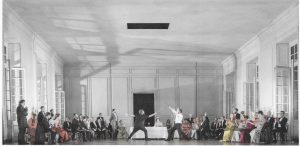We New Yorkers aren’t shy about our love of music, and opera remains high on our list. Despite the loss of the New York City Opera several years ago, and, sadly, very limited performances from the city’s many smaller, independent opera companies (due to the pandemic over the past two years), the Metropolitan is back with us this season and so far has not missed a single performance.

Photo: Glyndebourne Festival Opera, 2017
Which brings me to two operas to tell you about. One is new (to us in New York). It’s Brett Dean and Matthew Jocelyn’s Hamlet, from the Glyndebourne Festival Opera’s 2017 season. It came to us – by way of the Adelaide Festival in 2018 – to open at the Met last Friday night.
I think it’s terrific, but I’m perhaps a little prejudiced because I’ve had enough information to look forward to it. Since before Hamlet, I was among the lucky Met fans to hear General Manager Peter Gelb interview the production’s creative team a couple of weeks ago. He told us that when he flew to Glyndebourne for the production’s final performance, he decided on the spot to bring it to the Met. When we heard that, it was very clear that this is a production and a performance not to be missed.
Then last Tuesday I was in the opera house for the Final Dress Rehearsal and that did it: I’m going back to a real performance, and several friends and I are already booked for the final performance, the Saturday matinee on June 4.
Not surprisingly, given the quality of Shakespeare’s play, there have been other Hamlet operas over the years, and I’ve been familiar with only one of them (despite hearing opera-as-subject comedienne Anna Russell often tell her story about one Italian version, which she dubbed Hamletto). The one I was first exposed to came to the Met in 2010. It was by Ambroise Thomas, from 1868, and in that one, we find that Thomas (according to one critic) kept “close to Shakespeare’s basic plot, with an added Mad Scene for Ophelia.”
Some of that approach is built into the new version at the Met and it includes – if you’re an opera lover – a beautifully constructed and performed mad scene, sung by Brenda Rae. But there’s more – so much more – and in referring to the mad scene I don’t mean to minimize the work of the rest of the cast and the creative team. The entire effort is simply spell-binding and the opera continually holds our attention. Indeed, this Hamlet is a version that is continually gripping (as any performance of Shakespeare’s play or any other adaption of the story is and must be). And, as one of my friends put it after the rehearsal last week, “‘Hamlet’ is by definition a dark story. We don’t come to see a ‘Hamlet’ expecting anything less serious.”
At the same time, with the new opera, we have an opportunity, as with any great classic, to see a bit of “rearrangement,” – we might call it – for some of the plot and some or the words. In fact, quite a bit, and it’s absolute correct and fits perfectly with what is being done here. Indeed, in ‘To Be or Not to Be’: Is It the Question or the Point? in The New York Times on May 6, Stephen Greenblatt gives us a very clear (and approving) description of what’s going on:
The opera’s gifted librettist, Matthew Jocelyn, grasped what Shakespeare scholars have come to understand, that there is no single definitive text of the play. …
From the beginning, the playwright seems to have expected any given production to pick and choose, shaping “Hamlet” for its particular time and occasion. All versions are the result of choices, cuts, alterations.
All of this clearly lies behind Jocelyn’s evident sense of freedom in refashioning the text, which in any case would have had to be reduced in length to serve as the libretto. Only about 20 percent of the lines in the full-length play make it into the opera, leaving room for the music, as Dean has said, to be the protagonist.
What is striking, given the drastic cuts, is how much of what has obsessed the readers and audiences of “Hamlet” over the past several hundred years powerfully resonates in this operatic reimagining.
As I’m sure I’ve made clear, Hamlet is well worth attending. And the review I read (Zachary Woolfe’s ‘Hamlet’ Boldly Engulfs the Metropolitan Opera) tells me that those of us who experienced Hamlet were on the right track. The opera will be available in cinemas throughout the world via the Met’s Live in HD programs on Saturday, June 4. And hopefully at some point Hamlet will join the more than 800 full-length Met performances from the Met on The Met on Demand, the Met’s online streaming service. I’ll be surprised if it isn’t back at the Met in future seasons.
My other reference to a “new” program at the Met is to Phillip Glass’s Akhnaten, which came to the Met in November, 2019. So this is not really a new opera, as such. Unfortunately, I did not get to share my thoughts about Akhnaten in 2019 and I’ll write about the revival of this remarkable work in my next post, coming in a few days.
Leave a Reply